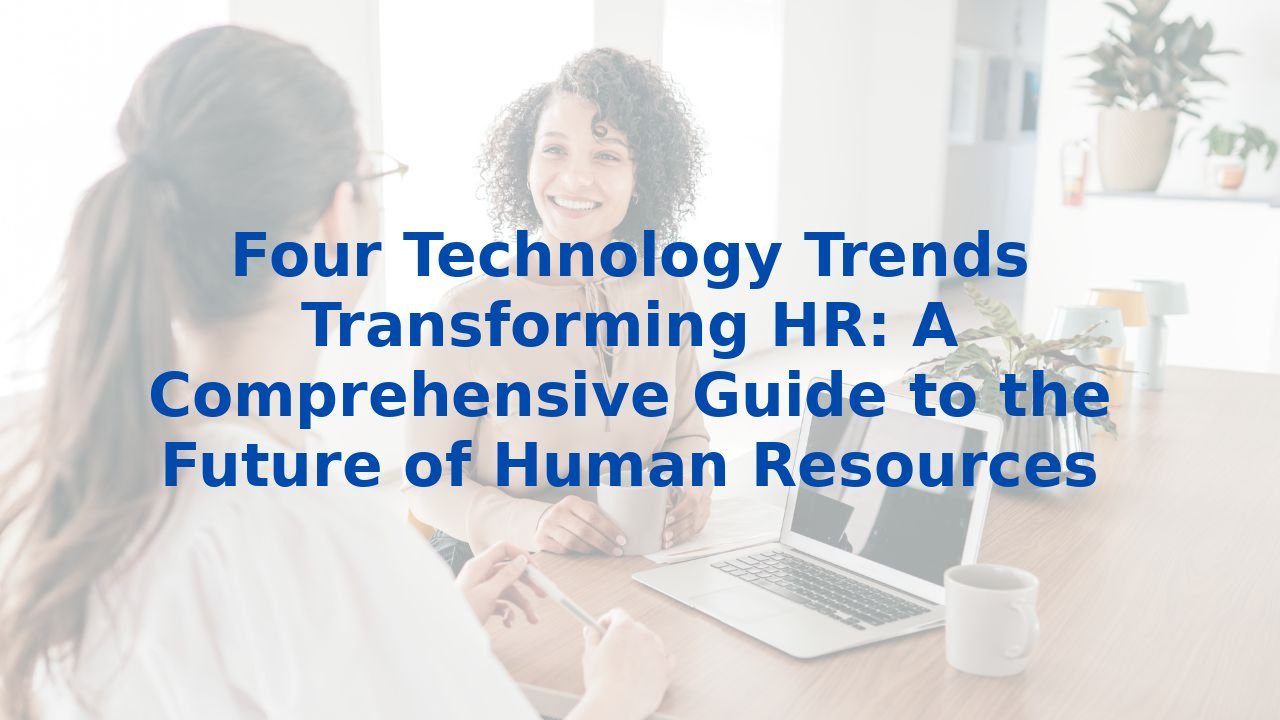Four Technology Trends Transforming HR: A Comprehensive Guide to the Future of Human Resources
Four Technology Trends Transforming HR: A Comprehensive Guide to the Future of Human Resources
Introduction
In today's fast-paced business landscape, the Human Resources (HR) department serves as the backbone of organizational success. As we plunge deeper into the digital age, technology is not just a tool for optimization—it's a catalyst for transformation. This article explores four significant technology trends reshaping HR processes, emphasizing how artificial intelligence (AI) can enhance efficiency, streamline operations, and improve overall organizational performance.
1. Artificial Intelligence (AI) in HR
Enhancing Efficiency
AI is revolutionizing the HR landscape by automating mundane tasks that traditionally consume significant time and resources. Tools powered by AI can sift through vast datasets, enabling HR teams to identify top talent quickly and streamline recruitment processes. Imagine AI-driven platforms that provide personalized job recommendations tailored to candidates' profiles, or chatbots that handle initial inquiries, freeing HR personnel to engage in strategic initiatives.
Benefits of AI Training for Employees
The efficacy of AI in HR isn't just about the technology; it's about the people who wield it. Training employees on AI tools equips them with the competencies needed to maximize their potential. They learn to articulate effective prompts, evaluate AI-generated content, and seamlessly integrate these tools into everyday workflows. This training is not just beneficial; it is essential for enhancing the efficiency and productivity of HR teams, empowering them to make informed decisions that elevate organizational performance.
2. Machine Learning (ML) in HR Analytics
Data-Driven Decision Making
Machine learning represents a paradigm shift in HR analytics. By delving into large datasets, ML algorithms provide actionable insights that allow HR departments to make informed, data-driven decisions. For example, predicting employee turnover, identifying talent gaps, and optimizing engagement strategies become feasible with the predictive capabilities of ML.
Benefits of AI Training for Employees
Equipping employees with ML training fosters a culture of data literacy within HR teams. Professionals learn to interpret complex analytics, predict trends, and develop models that align with organizational objectives. This type of training is invaluable as it ensures that HR strategies are not just reactive but proactively designed to navigate the future of work.
3. Natural Language Processing (NLP) in Communication
Improved Communication
Effective communication is the heartbeat of any workplace, and NLP is redefining how HR interacts with employees and candidates. NLP-powered tools can comprehend and generate human-like text, fostering more personalized communication. Imagine having AI-driven chatbots offering tailored career advice or NLP algorithms efficiently analyzing employee feedback, pinpointing areas needing enhancement.
Benefits of AI Training for Employees
Understanding NLP is crucial for HR professionals in today's interconnected world. Training in this area empowers employees to create effective prompts, assess the accuracy of AI-generated text, and integrate NLP tools into their communication strategies. The result? Clear, engaging, and meaningful interactions that resonate with staff and candidates alike.
4. Blockchain in Talent Management
Secure and Transparent Talent Management
As organizations seek to enhance security and transparency, blockchain technology emerges as a viable solution for talent management. By utilizing blockchain, HR can establish secure, tamper-proof records of employee data, contracts, and certifications. This not only safeguards sensitive information but also bolsters the integrity of talent management processes.
Benefits of AI Training for Employees
Blockchain isn't just a buzzword; it represents a foundational shift in how data is handled in HR. Training employees on blockchain principles equips them with the knowledge required to manage and verify data efficiently. This ensures that HR processes remain secure, compliant with regulations, and transparent, fostering trust among employees and stakeholders alike.
Conclusion
The convergence of AI, ML, NLP, and blockchain technologies is not merely an evolution—it's a revolution in the HR domain. These innovations enhance efficiency, refine decision-making processes, and ensure the security and transparency of talent management. To fully harness these trends, organizations must invest in training their workforce, paving the way for improved organizational performance and a competitive advantage in the marketplace. The journey ahead is filled with potential, and equipping employees with the right skills will unlock groundbreaking possibilities for the future of human resources.



